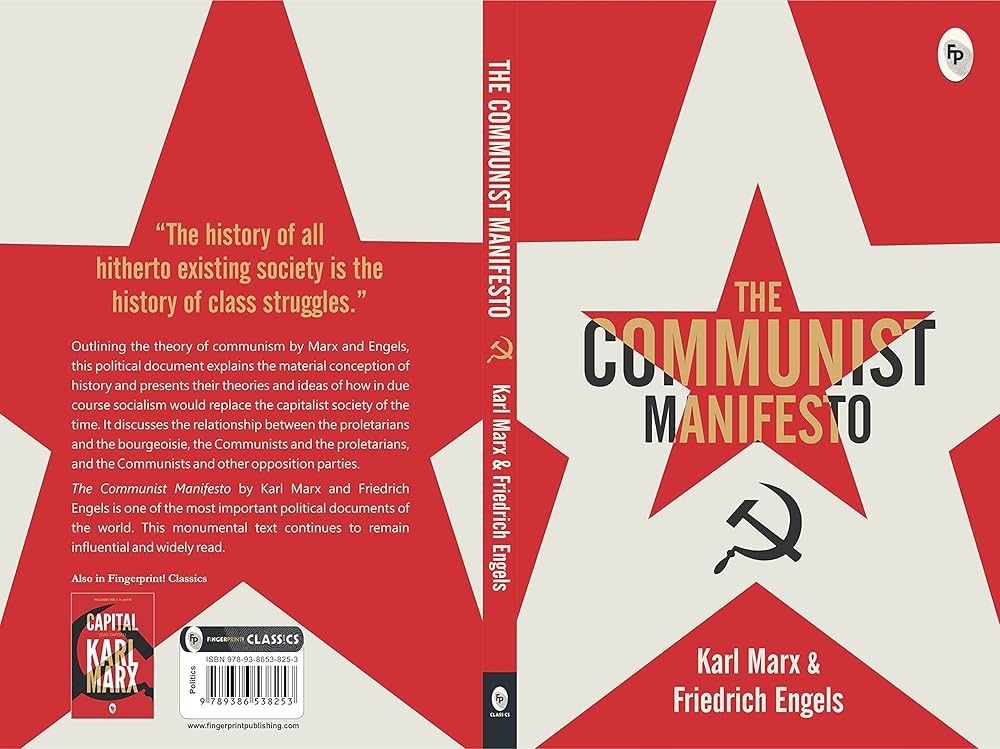The Communist Manifesto: A Blueprint for Tyranny and Mass Murder
The book is not just a flawed ideological blueprint; it is a dangerous doctrine that has justified totalitarianism, mass executions, and economic collapse wherever its principles have been implemented.

Karl Marx and Friedrich Engels published The Communist Manifesto in 1848, a pamphlet that promised liberation for the working class but instead laid the foundation for some of the most oppressive and brutal regimes in human history.
While it is often glorified as a revolutionary text advocating equality, its practical applications have led to suffering, economic ruin, and the deaths of millions.
The book is not just a flawed ideological blueprint; it is a dangerous doctrine that has justified totalitarianism, mass executions, and economic collapse wherever its principles have been implemented.
The Theoretical Fallacies of Marxism
At its core, The Communist Manifesto presents a simplistic and naive view of human society. Marx and Engels reduce history to an endless class struggle, claiming that the only path forward is the complete abolition of private property and the dictatorship of the proletariat.
This reductionist approach ignores the complexities of human motivation, cultural diversity, and economic development. The assumption that workers worldwide would unite against capitalists was not only incorrect but fundamentally ignored national, ethnic, and religious identities that shape human behavior far more than class consciousness ever has.

Marx’s belief in the inevitability of communism as the final stage of human development is another glaring error. History has shown that societies evolve in various ways, and no single model applies universally. The free market has lifted billions out of poverty, whereas communist experiments have left nations in destitution. Yet, Marxist rhetoric continues to lure the gullible with false promises of equality while ignoring the catastrophic results of its implementation.
Communism’s Deadly Legacy
No ideology has caused as much suffering and death as communism. From the Soviet Union under Stalin to Mao’s China, Pol Pot’s Cambodia, and present-day North Korea, the Marxist model has consistently resulted in mass killings, repression, and economic disaster.
Soviet Union: Stalin’s Reign of Terror
The Bolshevik Revolution of 1917 was directly inspired by Marxist ideology. Lenin and later Stalin used The Communist Manifesto as justification to dismantle free enterprise, suppress political dissent, and impose a one-party dictatorship.

The result? The Holodomor, a man-made famine in Ukraine, killed nearly four million people. Stalin’s Great Purge saw the execution or imprisonment of millions more. The gulag system turned the Soviet Union into a prison state where intellectuals, farmers, and political dissidents were either shot or worked to death.
Mao’s China: The Great Leap Backward
Mao Zedong, another disciple of Marxism, implemented policies based on The Communist Manifesto that resulted in famine and mass death on an unprecedented scale. The so-called Great Leap Forward (1958-1962) sought to rapidly industrialize China but instead led to an estimated 45 million deaths due to famine and state violence.

The Cultural Revolution further plunged the nation into chaos, as intellectuals and suspected “bourgeois” individuals were persecuted, tortured, and executed.
Pol Pot’s Cambodia: Year Zero and the Killing Fields
In the 1970s, the Khmer Rouge, led by Pol Pot, attempted to create a communist utopia inspired by The Communist Manifesto. Their vision? The abolition of private property, forced labor camps, and mass executions.
Within four years, approximately two million Cambodians—nearly a quarter of the population—were killed in one of the worst genocides of the 20th century. Those considered intellectuals, including people who simply wore glasses, were executed as part of an effort to destroy any opposition to the communist order.
North Korea: A Living Communist Nightmare
Even today, North Korea stands as a stark reminder of the failures of communism. Established as a Marxist-Leninist state, it has turned into a hereditary dictatorship where starvation, labor camps, and extreme political repression define daily life. The Kim dynasty continues to rule with an iron fist, maintaining one of the most repressive regimes in modern history.
Economic Collapse and the Failure of Central Planning
One of the most critical flaws in The Communist Manifesto is its economic vision. Marx and Engels advocate for the abolition of private property and the establishment of a centrally planned economy, where the state controls all means of production. This idea has failed every time it has been attempted.
Cuba, despite decades of communist rule, remains impoverished, with citizens fleeing the country for better opportunities. Venezuela, once one of South America’s wealthiest nations, plunged into economic ruin after adopting socialist policies inspired by Marxism.
Communism’s Assault on Human Rights and Freedom
Beyond economic disaster, Marxism has led to the systematic violation of human rights. Every communist regime has relied on mass surveillance, political imprisonment, and violent suppression of dissent. Free speech, freedom of religion, and personal liberties are incompatible with Marxist doctrine, which demands total allegiance to the state.
_202502201144424731_H@@IGHT_188_W@@IDTH_267.jpeg)
The brutal tactics used by communist regimes—indoctrination, forced labor, re-education camps, and mass executions—prove that The Communist Manifesto does not liberate but enslaves. The dictatorship of the proletariat, rather than ensuring equality, results in a new ruling class: an authoritarian elite that controls every aspect of life while the masses suffer.
Conclusion
The Communist Manifesto is not a guide to a better world; it is a dangerous, destructive doctrine that has brought only misery wherever it has been implemented. Karl Marx and his ideological successors have left a legacy of death, oppression, and economic devastation. History has already judged communism as a failed experiment, and yet, its ideas continue to mislead those who do not study its real consequences.
Rather than embracing Marxist ideology, societies should learn from its catastrophic failures and work towards systems that promote freedom, individual rights, and economic prosperity. The world does not need another Marxist revolution—it needs to ensure that The Communist Manifesto is remembered not as a beacon of hope, but as a cautionary tale of ideology run amok.


